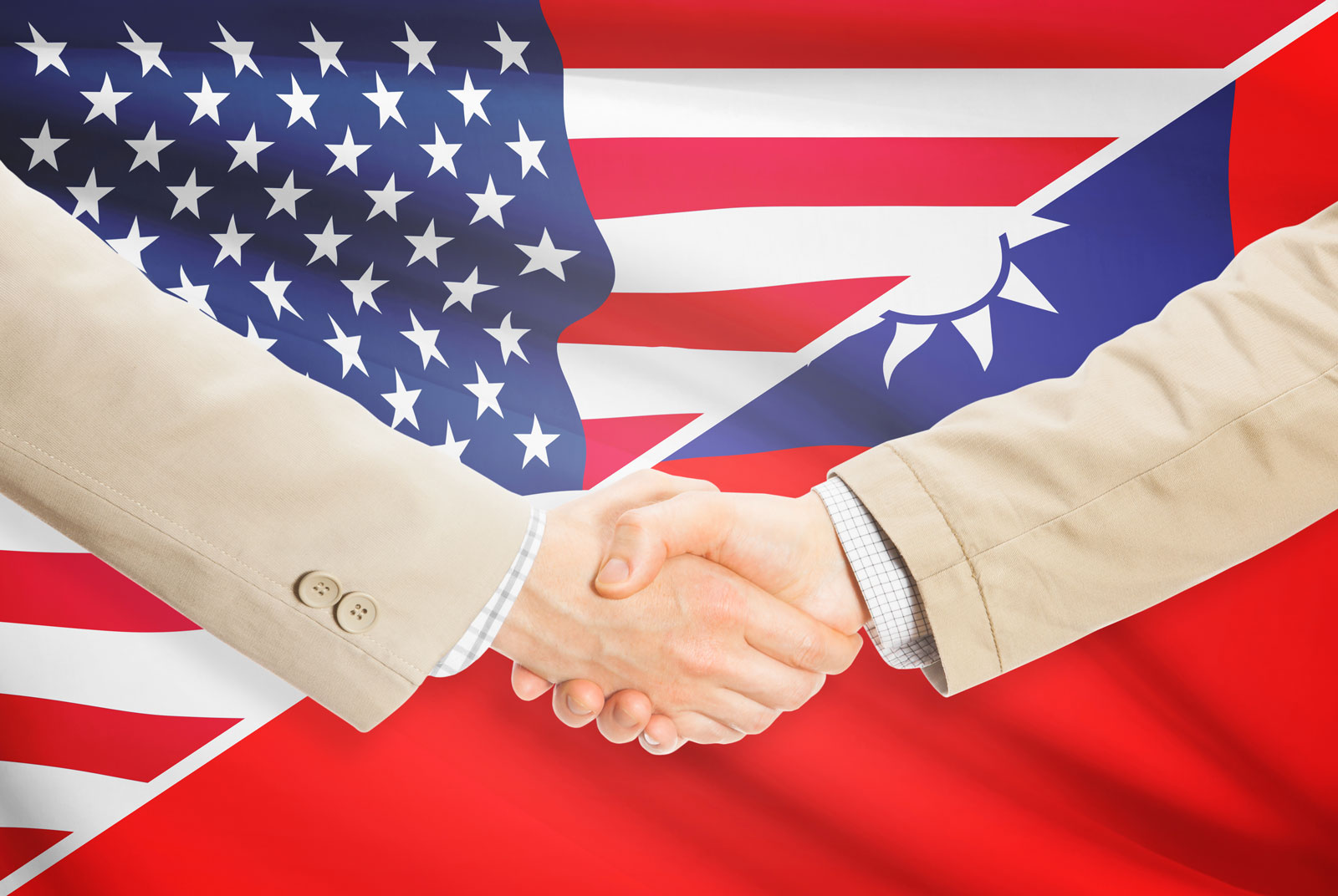Landmark U.S.-Taiwan Trade Initiative will lead to broader agreements

Source:shutterstock
The U.S.-Taiwan Trade Initiative marks a significant milestone in bilateral economic relations, fostering inclusive growth and cooperation. This op-ed highlights its key provisions covering customs, trade facilitation, regulatory practices, anti-corruption measures, and support for small businesses
Views
Landmark U.S.-Taiwan Trade Initiative will lead to broader agreements
By Ian Murphyweb only
After several rounds of negotiations, the United States and Taiwan have arrived at an agreement on five issues covered by the U.S.-Taiwan Initiative on 21st Century Trade. The Initiative, which was first launched in June 2022, aims to deepen trade and investment relationships between the United States and Taiwan, as well as “advance mutual trade priorities based on shared values, and promote innovation and inclusive economic growth for our workers and businesses.”
Under its negotiating mandate, 11 specific trade areas were identified for discussion between the two parties, listed as follows: trade facilitation, good regulatory practices, anti-corruption, SMEs, agriculture, standards, digital trade, labor, environment, state-owned enterprises, and non-market policies and practices. The series of negotiations were led by the American Institute of Taiwan and Taipei Economic and Cultural Representative Office in the United States.
Lawmakers expect this Initiative to be carried out in stages, with the passage of the agreement on the first five issues being just one part of the expected trade agreement. The U.S.-Taiwan Agreement is not a traditional trade agreement in that it does not negotiate direct market access, but rather creates mutually agreed upon conditions that will facilitate cross-border trade.
This agreement is expected to not only increase trade and investment between the United States and Taiwan, but between Taiwan and other countries as it both sets international precedent for trade agreements with Taiwan and by making it easier for countries and corporations to more easily do business with Taiwan.
Political will
The U.S.-Taiwan Initiative is being negotiated at a time when the U.S. public is skeptical about new trade agreements. Despite the economic benefits of trade agreements, a 2019 Pew Research Center poll found that less than 40% of Americans believe that trade agreements are good for the country, while 57% believe that they affect the country negatively.
This skepticism is due to a number of factors, including concerns about job losses, environmental damage, and the impact of trade agreements on wages and prices. A large portion of the American public blames two major trade deals for the country’s current issues - the North American Free Trade Agreement has been blamed for the loss of manufacturing jobs in the United States, and trade with China has been blamed for bolstering the PLA’s military capabilities and aggression. The Trans-Pacific Partnership became a political lightning rod in the 2016 presidential election for all candidates largely due to its lack of transparency.
These factors all shaped the U.S.-Taiwan Initiative. Although the U.S. is skeptical about trade agreements, the Biden and Tsai administrations have structured the agreement in such a way that reduces the political liability of the agreement being cancelled by an incoming administration or public protest. The Initiative is one of the most transparent trade negotiations in recent history, with the USTR negotiating the agreement in stages and publishing summaries of the chapters on its website. This defuses public frustration by allowing industries, lawmakers, rights organizations, and the public to shape negotiations and feel that their needs are represented in the agreement
Placing an emphasis on small and medium-size enterprises further enhances the perception that the U.S.-Taiwan Initiative is a democratic initiative that serves the public interest. A common criticism of free trade agreements is that they serve the interests of corporations and higher income adults, not the general public. The US-Taiwan Trade Initiative recognizes the value that SMEs bring to both economies, with SMEs accounting for 99.7% of all businesses and 47% of private sector employment in the United States alone. In Taiwan, SMEs account for 98% of all businesses and 66% of private sector employment.
Skepticism over traditional trade agreements has made negotiating a full U.S-Taiwan Free Trade Agreement politically difficult. However, structuring the U.S.-Taiwan Initiative to be more transparent, to reduce non-tariff trade barriers, and emphasize the importance of SMEs makes the agreement more survivable when a new administration is elected in either Taiwan or the United States. Borrowing from both WTO and trade frameworks found in the United States-Mexico-Canada Agreement improves the international standing of the U.S.-Taiwan Agreement by demonstrating good regulatory practices and equal and fair treatment towards Taiwan
First agreement
The first agreement, which was reached by both parties in May 2023 and signed on June 1 by AIT and TECRO, covers five issues namely, customs administration and trade facilitation, good regulatory practices, services domestic regulation, anti-corruption, and small-and medium-sized enterprises. It contains 81 articles on these five areas. Under customs administration and trade facilitation, the parties will streamline border procedures as well as reduce red tape, to make it easier, faster, and less costly for American businesses to export their products to Taiwan. Submission of custom forms and payment will now be done electronically, which will significantly reduce wait times for customs inspections. To ensure the successful implementation of the provisions under the Initiative, a Trade Facilitation Committee will be established to promote cooperation between AIT and TECRO in resolving issues and refining the trade agreement.
The text on SMEs aims to encourage SME trade and investment between the United States and Taiwan. Under this initiative, both parties will provide training programs to allow SMEs to know and understand how to conduct business in both countries and improve their business performance in both markets. Related to this, the text on good regulatory practices is set to create transparency tools and mechanisms to educate SMEs on cross-border regulatory procedures. The text also makes way for the creation of the Good Regulatory Practices Committee, composed of representatives of both parties and relevant representatives of concerned government agencies in both parties.
The focus on good regulatory procedures is especially beneficial for service companies. Regulators are creating systems to better inform service companies of the requirements to obtain relevant licenses to operate in their target market and provide applicants a fair opportunity to demonstrate that they meet the requirements and are therefore qualified to operate.
The chapter on anticorruption provides that both the U.S. and Taiwan commit to establishing comprehensive anticorruption measures to prevent bribery of public officials, money laundering, and the protection of whistleblowers. One step towards greater transparency includes requiring public officials to disclose their financial interests and to report any conflicts of interest. In addition, this chapter leverages financial institutions in the fight against corruption by requiring them to take steps to identify and report suspicious transactions. The chapter on anticorruption is an important part of the U.S.-Taiwan Trade Initiative. It is designed to help to prevent and combat corruption, which can distort trade and investment flows. The chapter also sends a strong signal that both sides are committed to fighting corruption while setting a framework for future anticorruption agreements with other countries.
Major breakthroughs
The Initiative marks a significant breakthrough in US-Taiwan relations as it constitutes Taiwan’s first formal trade agreement with the United States. While the U.S. entered into negotiations with Taiwan in the past through Trade and Investment Framework Agreements (TIFA), it is very different from the Initiative in the sense TIFA provisions are not mandatory on both parties. Moreover, meetings are not conducted regularly and dialogues are only launched when both the U.S. and Taiwan both have issues they want to discuss mutually. Since its inception in 1995, only 11 TIFA council meetings have been held.
For decades, Taiwan has remained isolated from the international diplomatic landscape due to China’s “One China Policy”, which constrains Taiwan’s relationship with most countries. This was the very reason why Taiwan was left out of the Indo-Pacific Economic Framework. Having Taiwan in the framework could result in a potential scenario wherein other countries would be hesitant to join to avoid backlash from China. It is hoped that the Initiative would have a “model effect” for Taiwan, such that it would reduce other countries’ apprehension about trade agreements with Taiwan and that it could pave the way for Taiwan being able to join regional trade organizations. As a matter of fact, several months after the Initiative was launched on June 1, 2022, Taiwan and Canada started formal negotiations on a Foreign Investment Promotion and Protection Agreement in February this year.
The future of U.S.-Taiwan economic relations
The Initiative, as it presently stands, does not alter tariffs on trade goods between the parties nor does it address the issue of double taxation that has been raised by Taiwan. What the Initiative does do is lay the groundwork for separate talks with the U.S. Treasury Department. The U.S.-Taiwan Trade Initiative is a crucial milestone in the bilateral economic relationship. Taiwanese trade representative John Deng (鄧振中) said that the Initiative could be precursor to a potential free-trade agreement between the United States and Taiwan.
On June 21, 2023, the U.S. House of Representatives approved the first agreement of the Initiative and is pending ratification of the U.S. Senate. Meanwhile, the AIT and TECRO are preparing to engage in another round of negotiations for the remaining issues in their negotiating mandate. Taiwan, for its part, aims to focus on agriculture for phase two of the negotiations. Previous discussions on agricultural products often centered on the U.S. urging Taiwan to open its markets to beef and pork imports.
This time, however, Deng is hopeful trade talks will expand exports of Taiwanese farm products to the U.S. market. Previously, Taiwan’s excess agricultural products would be exported to China. However, due to China’s recent politically-motivated bans on Taiwan exports, Taiwan was forced to find new markets for exports, such as Singapore and Japan. The U.S.-Taiwan Trade Initiative will help Taiwan diversify away from China and bring balance to its trade and political relationship with Beijing.
The United States and Taiwan have reached a significant milestone in their bilateral economic relationship with an agreement on five key issues as part of the U.S.-Taiwan Initiative on 21st Century Trade, potentially paving the way for a future free-trade agreement. This agreement addresses a broad array of issues, including customs administration, trade facilitation, good regulatory practices, domestic services regulation, anti-corruption, and support for small- and medium-sized enterprises, all aimed at facilitating cross-border trade and investment while fostering SME cooperation between the two nations.
While it awaits ratification by the U.S. Senate, where approval is anticipated. This trade initiative showcases America's support for Taiwan, viewed as a critical ally, and could assist in shifting Taiwan's economic dependence away from China, thereby providing balance in its trade and political relationships with Beijing.
About the Author

Ian Murphy has a background in national security and international business. He earned an MA in National Security Studies at American Military University and currently works at Safe Spaces LLC as a Policy Analyst Consultant, where he helps clients bridge the gap between their business strategies and the geopolitical security environment. Ian can be reached at [email protected].
Have you read?
- US-Taiwan trade talks and the need for speed
- China vs. Taiwan: The battle for diplomatic allies
- How the Bilingual 2030 Policy will boost Taiwan’s global competitiveness
Uploaded by Ian Huang






